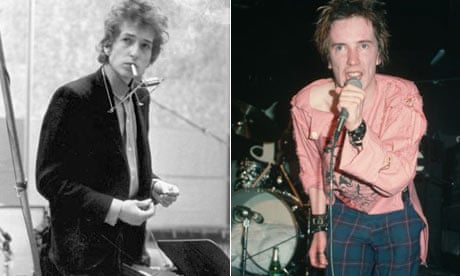How dada spawned the art of anarchy
Punk music and dadaism share a fine heritage of anti-art sentiment, as a book about the Sex Pistols shows

One of the best books about modern art I have ever read is Lipstick Traces: A Secret History of the Twentieth Century by rock critic Greil Marcus. In this compelling, contentious work, Marcus discerns a direct lineage from the dada cabaret in Zurich in 1916 to the Sex Pistols. As a book about the Sex Pistols, it suffers from John Lydon's dismissal of its argument. But as a book about dada, it is wonderful.
Incidentally, there's an insight for rock legends here into how to manage your history. Lydon's scepticism about Marcus contrasts with Bob Dylan's response to the same author's later book, Invisible Republic: Bob Dylan's Basement Tapes. In acclaiming a critic's insights into his own work, Dylan helped himself a bit further into the canon. Lydon, on the other hand, seemed to want to deny any serious importance levelled at the Sex Pistols.
That's anti-art for you. Punk and dada, across the decades, share a savage hostility to the security and luxury of artistic respectability. The true anti-artist is never interested in compromise: for Lydon, to class the Pistols as high art was to tame them, contain them. This same anti-art rage is exemplified by Gustav Metzger, whom I interviewed recently, and whose concept of "auto-destructive art" is yet another variant of modern art's impulse to smash reality.
This impulse to destruct, efface, obliterate cannot be confined to a single kind of modern art. There is as much negation, as icy a contemplation of the void, in the Rothko Chapel in Houston as in any dada collage.
This is why Marcus writes so well about dada and its legacy, because he sees its bitter, liberated heart and does not take for granted what it was. It is also why to dismiss "anti-art" tendencies today is to be blind to the way they permeate the entire history of modernism – in short, to be a stuckist.
Incidentally, there's an insight for rock legends here into how to manage your history. Lydon's scepticism about Marcus contrasts with Bob Dylan's response to the same author's later book, Invisible Republic: Bob Dylan's Basement Tapes. In acclaiming a critic's insights into his own work, Dylan helped himself a bit further into the canon. Lydon, on the other hand, seemed to want to deny any serious importance levelled at the Sex Pistols.
That's anti-art for you. Punk and dada, across the decades, share a savage hostility to the security and luxury of artistic respectability. The true anti-artist is never interested in compromise: for Lydon, to class the Pistols as high art was to tame them, contain them. This same anti-art rage is exemplified by Gustav Metzger, whom I interviewed recently, and whose concept of "auto-destructive art" is yet another variant of modern art's impulse to smash reality.
This impulse to destruct, efface, obliterate cannot be confined to a single kind of modern art. There is as much negation, as icy a contemplation of the void, in the Rothko Chapel in Houston as in any dada collage.
This is why Marcus writes so well about dada and its legacy, because he sees its bitter, liberated heart and does not take for granted what it was. It is also why to dismiss "anti-art" tendencies today is to be blind to the way they permeate the entire history of modernism – in short, to be a stuckist.
No comments:
Post a Comment